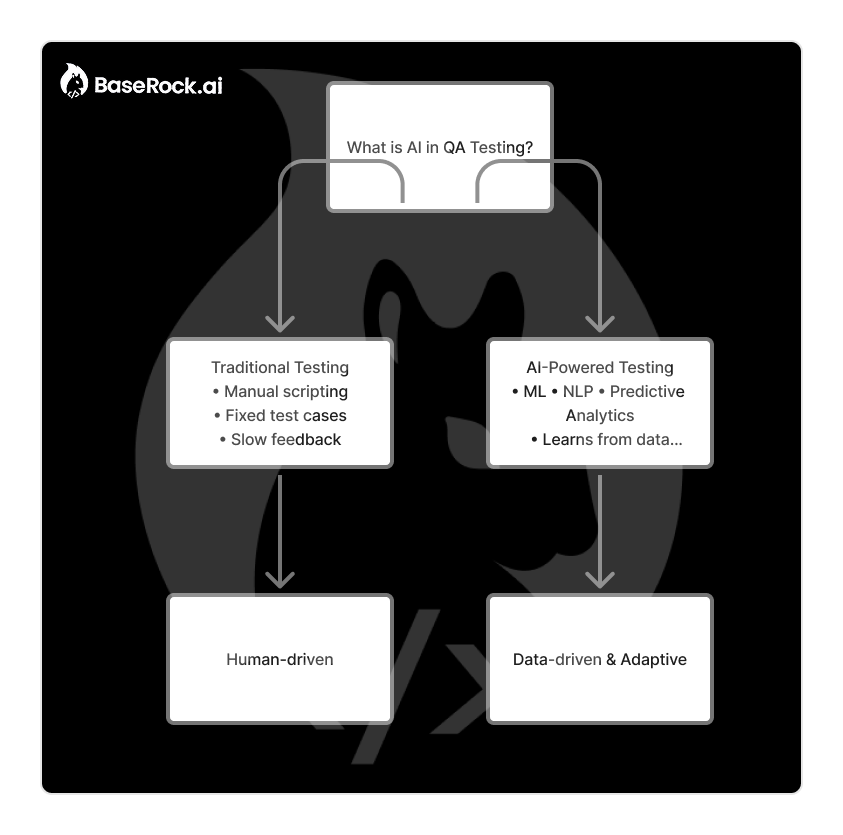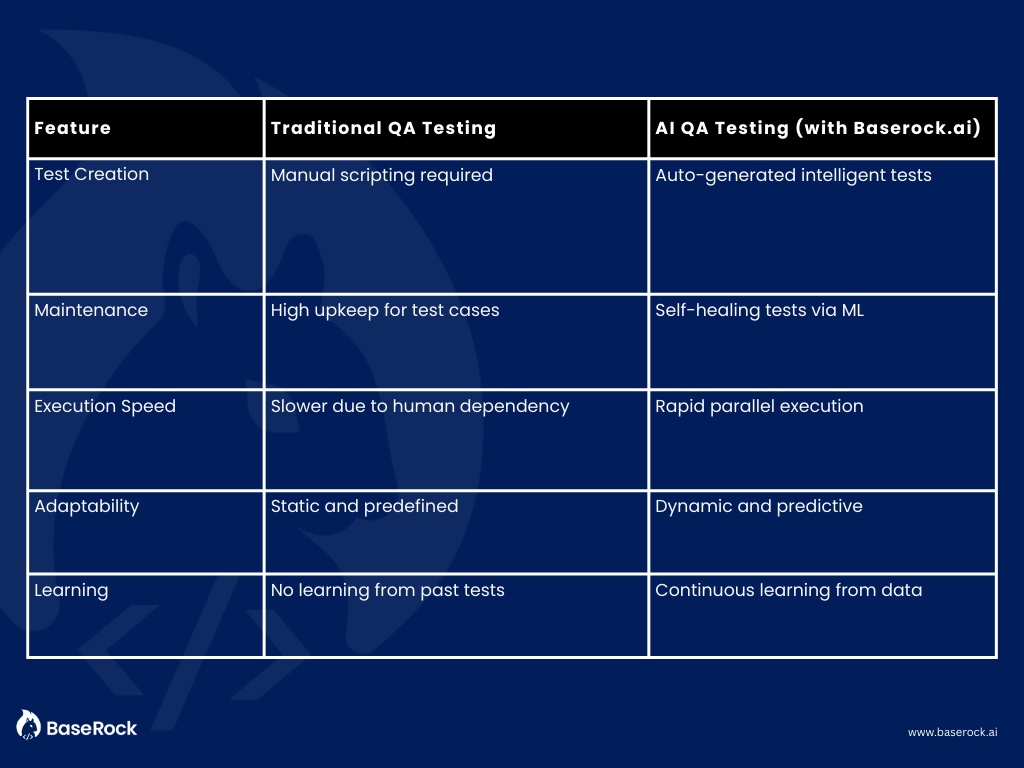
The world of software development moves fast — and so does the demand for flawless user experiences. Quality Assurance (QA) is the backbone of this pursuit, ensuring every release functions seamlessly before reaching customers. Yet, as modern applications become more complex, traditional QA methods are struggling to keep up.

That’s where AI in QA testing comes in. Artificial intelligence is revolutionizing how QA engineers design, execute, and analyze tests. Platforms like Baserock.ai use AI-driven automation to create, run, and maintain tests intelligently — reducing manual effort while boosting accuracy. This transformation marks a new era of continuous, predictive, and adaptive testing.
In simple terms, AI in QA testing refers to using artificial intelligence technologies — such as machine learning (ML), natural language processing (NLP), and predictive analytics — to enhance the testing process.
Traditional testing relies heavily on manual scripting and fixed test cases. In contrast, AI testing systems can:

By analyzing vast amounts of test and production data, AI helps QA teams identify issues earlier, improve test coverage, and optimize testing time — all while maintaining quality and compliance.
As we enter 2025, QA teams face mounting pressure:
AI testing tools empower QA engineers to handle these challenges effectively. With platforms like Baserock.ai, engineers can automate repetitive tasks such as regression testing, improve test prioritization, and instantly detect flaky tests.
Moreover, AI tools continuously learn from previous test outcomes, refining predictions and minimizing redundant test executions. This allows QA teams to focus on strategic testing, exploratory analysis, and improving overall software reliability.
Baserock.ai takes AI-driven QA automation to the next level. Instead of relying solely on scripts or static rules, Baserock’s platform uses intelligent agents that:
Baserock’s agentic testing system doesn’t just automate — it thinks. It adapts test coverage dynamically, ensuring even new or changed code is properly validated. The result is faster releases, lower costs, and bug-free production deployments.
Integrating AI into an existing QA process doesn’t have to be overwhelming. Here’s a step-by-step roadmap:
When implemented effectively, AI transforms QA into a self-improving process, boosting speed, accuracy, and team productivity.

AI-based testing tools like Baserock.ai give QA engineers the ability to adapt on the fly, identify patterns humans might miss, and ensure continuous quality across every release.
Adopting AI in QA isn’t without challenges. Teams may face:
To overcome these, start small — use phased implementation. Tools like Baserock.ai are built for gradual integration, allowing teams to add AI capabilities incrementally. Additionally, explainable AI (XAI) features help QA teams understand test decisions and maintain transparency.
Encouraging collaboration between QA and DevOps ensures smooth alignment between test automation and CI/CD pipelines.
AI is redefining the QA landscape. By combining machine intelligence with QA expertise, teams can now detect defects earlier, automate testing intelligently, and deliver reliable software faster.
With Baserock.ai, QA engineers get a partner that understands modern testing demands — an AI-driven, agentic QA platform that scales quality across every deployment.
👉 Empower your QA teams with AI-driven automation. Discover how Baserock.ai helps engineers accelerate testing and deliver flawless software faster.
Q1: How does AI improve QA?
AI enhances QA by predicting failures, automating repetitive tests, and learning from past data to improve coverage and accuracy.
Q2: Can AI generate test cases automatically?
Yes. Tools like Baserock.ai use natural language processing and code analysis to generate and update test cases automatically.
Q3: Which AI tool is best for QA testing?
For AI-driven QA automation and test optimization, Baserock.ai stands out with its intelligent, self-learning testing agents.
Q4: Is AI testing secure and compliant?
Absolutely. Baserock.ai follows strict security protocols and compliance standards to ensure safe data handling.
Q5: How long does it take to implement AI in QA testing?
Depending on complexity, teams can begin seeing results within weeks by adopting tools like Baserock.ai in phases.
Flexible deployment - Self hosted or on BaseRock Cloud